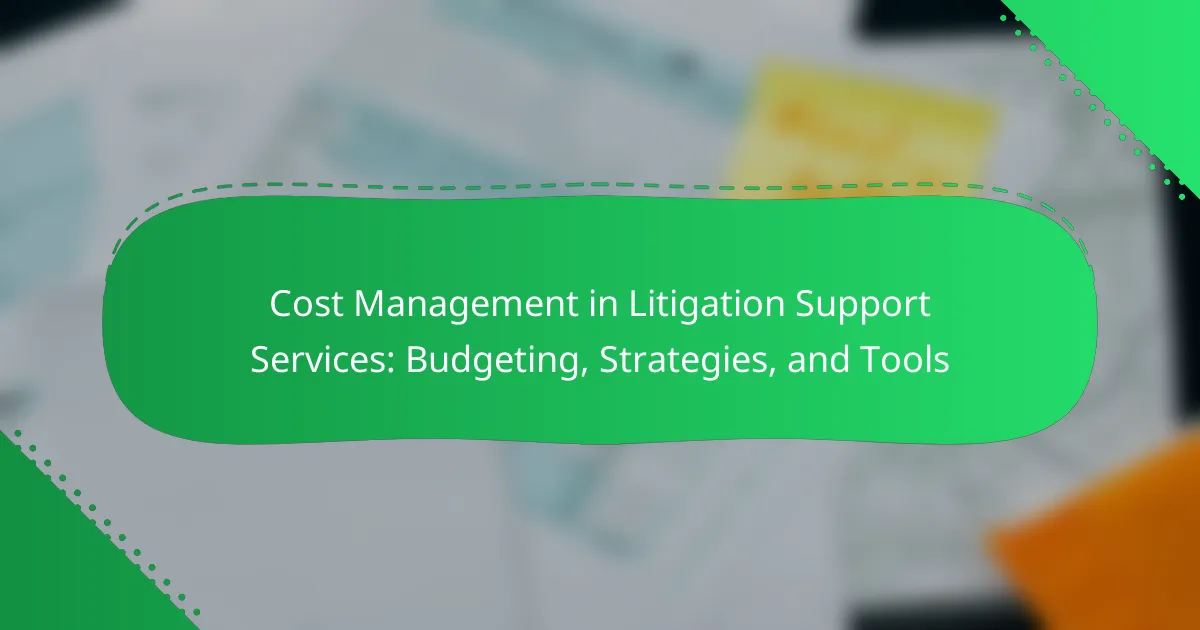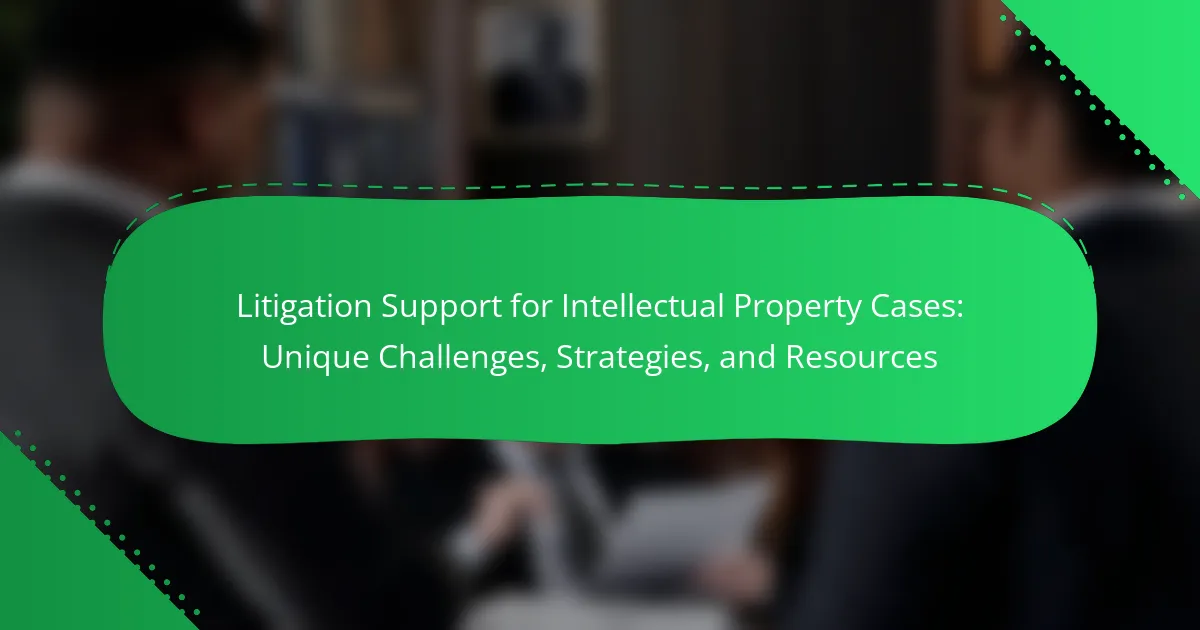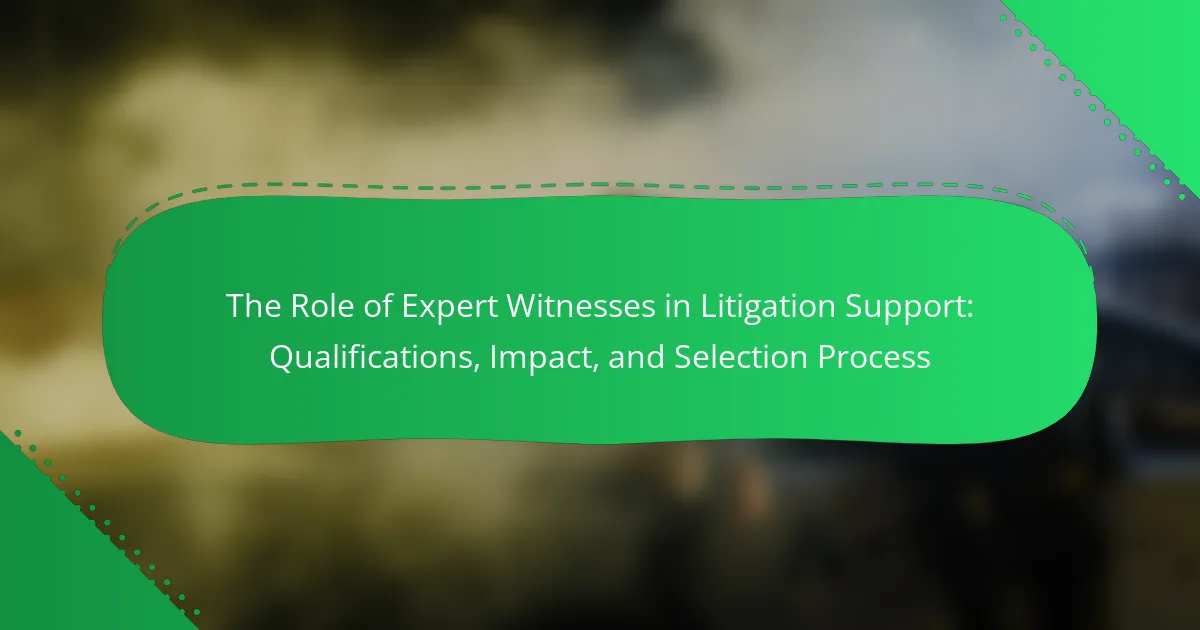Cost management in litigation support services involves the planning, monitoring, and controlling of expenses related to legal cases. This process includes establishing budgets, tracking expenditures, and optimizing resource allocation to prevent overspending. Key tools such as project management software, expense tracking applications, and document management systems are utilized to enhance budgeting and expense monitoring. Best practices emphasize systematic planning, regular budget reviews, and stakeholder communication to ensure financial efficiency. Training staff on cost management principles further supports effective implementation, contributing to better financial outcomes for clients.
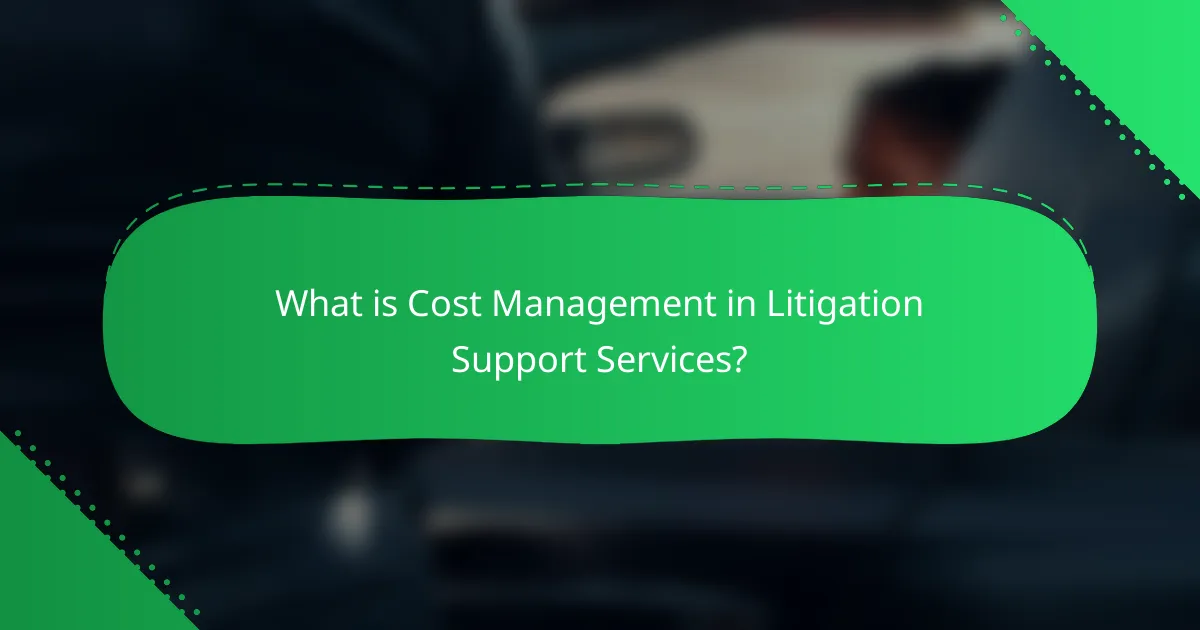
What is Cost Management in Litigation Support Services?
Cost management in litigation support services refers to the process of planning, monitoring, and controlling costs associated with legal cases. This involves establishing a budget, tracking expenses, and ensuring that resources are allocated efficiently throughout the litigation process. Effective cost management helps legal teams avoid overspending and ensures that financial resources are used wisely. It includes strategies such as forecasting costs, analyzing spending patterns, and implementing cost-saving measures. By utilizing software tools and methodologies, legal professionals can enhance their cost management practices, leading to better financial outcomes for clients.
How does Cost Management impact Litigation Support Services?
Cost management directly influences litigation support services by optimizing resource allocation. Effective cost management ensures that budgets are adhered to, preventing overspending. It allows for strategic planning, which can enhance the efficiency of legal processes. By controlling costs, firms can invest in better technology and skilled personnel. This investment leads to improved service quality and faster case resolution. Studies show that firms with robust cost management practices report higher client satisfaction. Additionally, well-managed costs can provide a competitive edge in the legal market. Overall, cost management is crucial for maintaining the financial health of litigation support services.
What are the key components of Cost Management in this context?
The key components of Cost Management in litigation support services include budgeting, cost estimation, cost control, and performance measurement. Budgeting involves creating a financial plan that outlines expected costs for litigation activities. Cost estimation requires assessing the resources needed, such as personnel and technology, to forecast expenses accurately. Cost control focuses on monitoring actual expenditures against the budget to identify variances. Performance measurement evaluates the efficiency and effectiveness of resource use throughout the litigation process. These components ensure that litigation support services remain within financial constraints while achieving desired outcomes.
How do these components interact to influence overall costs?
The components of litigation support services interact to influence overall costs by affecting resource allocation, service delivery, and operational efficiency. Budgeting determines the financial framework for resources. Strategies guide the selection of tools and services, impacting pricing. Tools utilized for litigation support can vary in cost and effectiveness. Efficient resource allocation minimizes waste and lowers costs. Service delivery methods, including in-house versus outsourced services, further influence expenses. The interplay of these components ultimately shapes the total expenditure in litigation support. For instance, a well-planned budget can lead to cost savings by optimizing resource use.
What are the common budgeting practices in Litigation Support Services?
Common budgeting practices in Litigation Support Services include detailed cost estimation, resource allocation, and ongoing monitoring. Cost estimation involves assessing all potential expenses related to litigation support. This can include technology costs, personnel expenses, and document management fees. Resource allocation ensures that funds are distributed effectively across various components of the litigation process. Ongoing monitoring tracks actual spending against the budget to identify discrepancies. Regular financial reviews help adjust budgets as necessary. Additionally, collaboration with legal teams ensures alignment of financial resources with case needs. These practices help maintain fiscal responsibility and support successful litigation outcomes.
What factors should be considered when creating a budget?
When creating a budget, several key factors must be considered. First, identify all sources of income. This includes salaries, investments, and any other revenue streams. Next, outline all fixed expenses. Fixed expenses are regular payments such as rent, utilities, and salaries. It is also important to account for variable expenses. Variable expenses can fluctuate, including costs for supplies and travel.
Additionally, consider any one-time expenses. These might include equipment purchases or special projects. Establishing a contingency fund is crucial for unexpected costs. A common recommendation is to set aside 10% of the total budget for contingencies.
Lastly, review historical data for accuracy. Analyzing past budgets helps in making informed projections. This ensures that the budget aligns with financial goals and objectives.
How can accurate forecasting improve budget management?
Accurate forecasting can significantly improve budget management by providing precise estimates of future costs and revenues. This allows organizations to allocate resources more effectively. When forecasts are based on historical data and market trends, they enhance financial planning. Accurate forecasts reduce the risk of budget overruns by identifying potential financial shortfalls early. Research shows that companies using accurate forecasting experience 10-15% lower budget variances. This leads to improved decision-making and strategic investments. Enhanced forecasting also aids in aligning budgets with organizational goals. Overall, accurate forecasting is essential for effective budget management in litigation support services.
What strategies can be employed for effective Cost Management?
Effective cost management strategies include budgeting, monitoring expenses, and optimizing resource allocation. Budgeting involves creating a detailed financial plan that outlines expected costs. This can help identify potential overspending areas early. Monitoring expenses in real-time allows for prompt adjustments to stay within budget. Regularly reviewing financial reports can highlight trends and variances. Optimizing resource allocation ensures that funds are directed towards high-impact areas. Implementing cost control measures, such as negotiating with vendors, can also reduce expenses. Utilizing technology for tracking and reporting can enhance accuracy and efficiency. These strategies collectively contribute to maintaining financial health in litigation support services.
How can technology enhance Cost Management strategies?
Technology enhances cost management strategies by providing tools for better tracking and analysis of expenses. Automated software can streamline budgeting processes, reducing manual errors. Real-time data analytics allows organizations to identify spending patterns quickly. Cloud-based solutions facilitate collaboration, enabling teams to access financial information anytime, anywhere. These technologies improve forecasting accuracy, allowing for more informed decision-making. Research by the Institute of Management Accountants shows that companies using advanced technology in cost management see a 20% increase in budgeting efficiency. Overall, technology transforms cost management into a more proactive and strategic function.
What role does communication play in managing costs effectively?
Effective communication plays a crucial role in managing costs. It ensures that all stakeholders are aligned on budget expectations and financial constraints. Clear communication helps identify potential cost overruns early. This allows for timely interventions to mitigate financial risks. Additionally, effective communication fosters collaboration among team members. This collaboration can lead to innovative solutions that reduce expenses. Studies show that organizations with strong communication practices can save up to 25% on project costs. Therefore, investing in communication strategies is essential for cost-effective management in litigation support services.
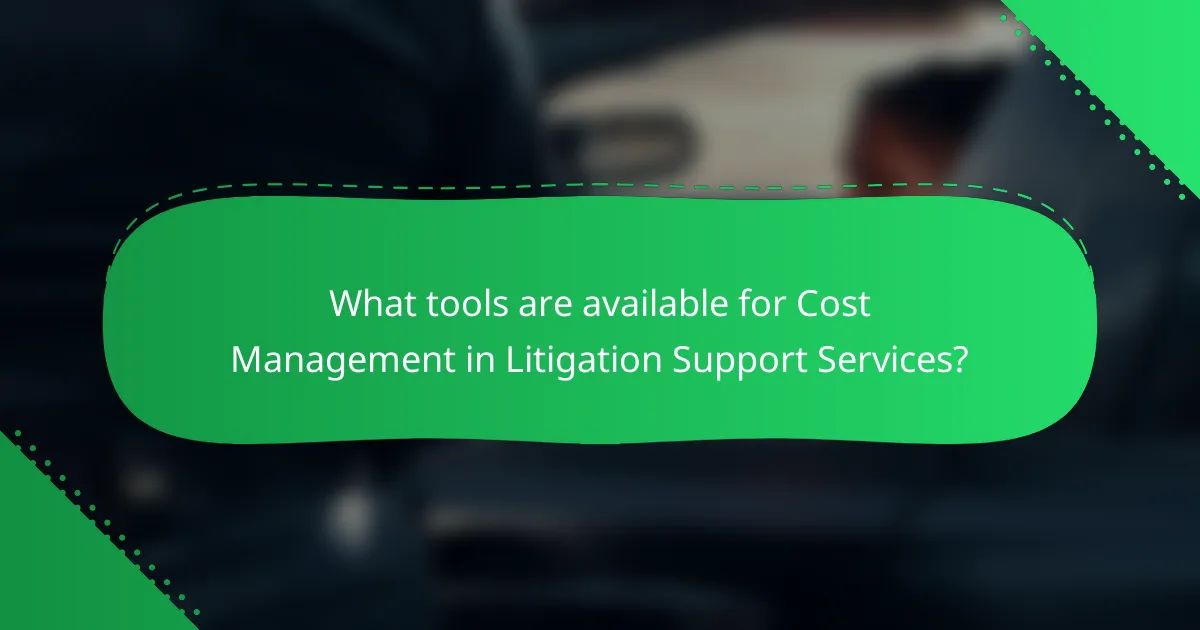
What tools are available for Cost Management in Litigation Support Services?
Cost management in litigation support services utilizes various tools for effective budgeting and expense tracking. Key tools include project management software, which helps in planning and monitoring budgets. Expense tracking applications allow for real-time recording of costs incurred during litigation. Document management systems facilitate organized storage and retrieval of case-related documents, aiding in budget adherence. Time tracking tools assist in monitoring billable hours, ensuring accurate invoicing. Additionally, financial analysis software provides insights into spending patterns and potential cost-saving opportunities. These tools collectively enhance the efficiency and accuracy of cost management in litigation support services.
How do software solutions contribute to Cost Management?
Software solutions enhance cost management by automating financial processes and providing real-time data analysis. They streamline budgeting by enabling precise tracking of expenses and revenues. This allows for quicker adjustments to financial plans. Additionally, software solutions facilitate better forecasting through data-driven insights. They help identify cost-saving opportunities by analyzing spending patterns. Tools like expense management software can reduce manual errors, leading to more accurate financial reporting. According to a study by Deloitte, organizations using software solutions for cost management can reduce operational costs by up to 30%. This underscores the effectiveness of software in managing costs efficiently.
What features should be prioritized in Cost Management tools?
Cost Management tools should prioritize features such as budgeting capabilities, expense tracking, and reporting functionalities. Budgeting capabilities allow users to create and manage financial plans effectively. Expense tracking helps monitor spending in real-time, ensuring adherence to budgets. Reporting functionalities provide insights into financial performance and help identify cost-saving opportunities. Additionally, integration with other software enhances data accuracy and efficiency. User-friendly interfaces improve accessibility for all team members. Customization options allow organizations to tailor the tool to specific needs. These features collectively enhance cost control and improve financial decision-making in litigation support services.
How can data analytics improve decision-making in Cost Management?
Data analytics can enhance decision-making in cost management by providing actionable insights into spending patterns. By analyzing historical data, organizations can identify trends and anomalies in costs. This allows for more accurate forecasting and budgeting. Data analytics tools can simulate various scenarios to assess potential financial outcomes. Implementing these insights can lead to cost reductions and optimized resource allocation. A study by McKinsey found that companies using advanced analytics can improve their decision-making speed by 5 to 10 times. This demonstrates the significant impact of data analytics on effective cost management strategies.
What are the challenges faced in Cost Management for Litigation Support Services?
Cost management for litigation support services faces multiple challenges. One major challenge is the unpredictability of litigation costs. Legal proceedings can be lengthy and complex, leading to fluctuating expenses. Another challenge is accurately estimating resource needs. This includes technology, personnel, and expert witnesses, which can vary significantly. Additionally, managing client expectations is difficult. Clients often have limited understanding of the costs involved, leading to potential disputes. Compliance with legal regulations also poses a challenge. Firms must ensure that all cost management practices adhere to relevant laws and guidelines. Lastly, integrating technology for cost tracking can be complex. Many firms struggle with the implementation of effective cost management software. These factors collectively complicate cost management in litigation support services.
How can organizations overcome common Cost Management obstacles?
Organizations can overcome common cost management obstacles by implementing structured budgeting processes. Establishing clear financial goals is essential. This allows organizations to allocate resources effectively. Regular monitoring of expenses helps identify deviations from the budget. Utilizing cost management tools can streamline tracking and reporting. Training staff on cost management principles enhances awareness and accountability. Engaging stakeholders in the budgeting process fosters collaboration and buy-in. According to a study by the Project Management Institute, organizations with effective budgeting practices experience 20% fewer project overruns. This demonstrates the impact of structured approaches on cost management success.
What are the implications of poor Cost Management on legal outcomes?
Poor cost management can lead to unfavorable legal outcomes. It often results in budget overruns, which can compromise case quality. Insufficient funding may limit access to necessary resources, such as expert witnesses or technology. This can weaken a legal team’s position and hinder effective representation. Additionally, poor financial planning can cause delays in legal proceedings. Delays may result in missed deadlines or rushed preparations, negatively impacting case results. Research indicates that firms with strict budget controls achieve better litigation outcomes. Effective cost management fosters strategic resource allocation, enhancing overall case performance.
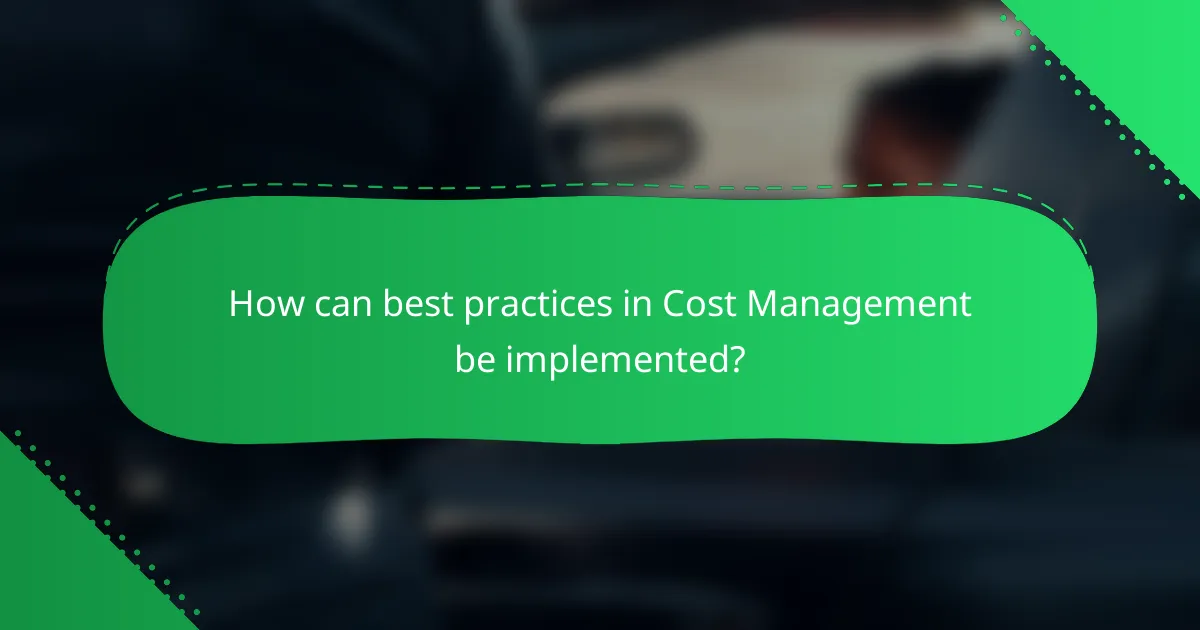
How can best practices in Cost Management be implemented?
Best practices in Cost Management can be implemented through systematic planning and monitoring. Establishing a clear budget is essential. This budget should reflect all expected costs associated with litigation support services. Regularly reviewing and adjusting the budget based on actual expenditures is crucial for accuracy.
Utilizing cost tracking tools can help in monitoring expenses in real-time. These tools provide insights into spending patterns and potential areas for savings. Engaging in regular communication with all stakeholders ensures alignment on budget goals.
Training staff on cost management principles enhances overall understanding and compliance. According to the Project Management Institute, effective cost management can lead to a 15% reduction in overall project costs. Implementing these practices leads to increased financial efficiency and better resource allocation.
What steps can organizations take to establish effective Cost Management practices?
Organizations can establish effective Cost Management practices by implementing several key steps. First, they should define clear budgeting processes. This involves setting specific financial goals and allocating resources accordingly. Next, organizations must monitor expenses regularly. Consistent tracking allows for timely adjustments and prevents overspending.
Additionally, organizations should analyze cost drivers. Understanding what influences costs helps in making informed decisions. They should also adopt technology solutions. Tools like budgeting software can streamline cost management efforts.
Furthermore, conducting regular training for staff is essential. Educated employees can better manage resources and identify cost-saving opportunities. Lastly, organizations should review and adjust their cost management strategies periodically. This ensures that practices remain relevant and effective over time.
How can continuous improvement be integrated into Cost Management processes?
Continuous improvement can be integrated into cost management processes by implementing regular reviews and updates of budgeting strategies. This involves setting clear performance metrics to evaluate cost efficiency. By utilizing methodologies such as Lean and Six Sigma, organizations can identify waste and streamline operations. Training staff on continuous improvement principles enhances their ability to contribute to cost-saving initiatives. Additionally, employing technology for data analysis can reveal trends and areas for improvement in cost management. Regular feedback loops ensure that changes are effective and adjustments can be made promptly. This approach leads to sustainable cost reductions over time.
What tips can help ensure successful Cost Management in Litigation Support Services?
To ensure successful cost management in litigation support services, establish a clear budget from the outset. This budget should detail all expected expenses, including technology, personnel, and resources. Regularly monitor actual costs against the budget to identify discrepancies early. Implement cost-effective technologies that streamline processes and reduce manual labor. Train staff on efficient practices to minimize wasted time and resources. Negotiate contracts with vendors to secure better rates and terms. Utilize project management tools to track expenses and timelines effectively. Regularly review and adjust strategies based on performance metrics to enhance future cost management efforts. These practices collectively contribute to improved financial oversight and resource allocation in litigation support.
How can regular reviews and adjustments enhance Cost Management effectiveness?
Regular reviews and adjustments enhance Cost Management effectiveness by ensuring alignment with financial goals. They allow for the identification of variances between projected and actual costs. This process facilitates timely corrective actions. It also helps in optimizing resource allocation. Regular assessments can reveal inefficiencies in spending. By adjusting budgets based on real-time data, organizations can make informed decisions. Studies show that organizations implementing regular reviews see a 10-15% reduction in unnecessary expenditures. This proactive approach ultimately leads to improved financial performance.
What resources are available for further learning on Cost Management strategies?
Books on cost management strategies include “Cost Management: A Strategic Emphasis” by Charles T. Horngren. This book provides comprehensive insights into cost management principles. Online courses are available on platforms like Coursera and edX. These courses often cover budgeting and financial analysis. The Project Management Institute (PMI) offers resources and certifications related to cost management. Additionally, the Association for Financial Professionals (AFP) provides articles and webinars on cost strategies. Industry journals such as the Journal of Cost Management feature research and case studies. These resources collectively enhance understanding of cost management strategies.
Cost Management in Litigation Support Services involves the planning, monitoring, and control of costs associated with legal cases, emphasizing budgeting, expense tracking, and resource allocation. This article outlines the impact of effective cost management on litigation outcomes, detailing key components such as budgeting practices, forecasting accuracy, and technology integration. It also explores strategies for overcoming common challenges in cost management, the importance of communication, and the tools available for enhancing financial oversight. By implementing best practices and continuous improvement, organizations can achieve better financial health and client satisfaction in litigation support services.
